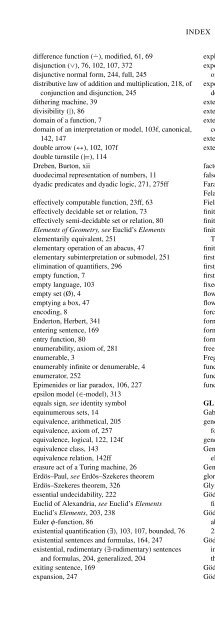Computability and Logic
Computability and Logic
Computability and Logic
Create successful ePaper yourself
Turn your PDF publications into a flip-book with our unique Google optimized e-Paper software.
INDEX 345<br />
difference function ( . −), modified, 61, 69<br />
disjunction (∨), 76, 102, 107, 372<br />
disjunctive normal form, 244, full, 245<br />
distributive law of addition <strong>and</strong> multiplication, 218, of<br />
conjunction <strong>and</strong> disjunction, 245<br />
dithering machine, 39<br />
divisibility (|), 86<br />
domain of a function, 7<br />
domain of an interpretation or model, 103f, canonical,<br />
142, 147<br />
double arrow (↔), 102, 107f<br />
double turnstile (|=), 114<br />
Dreben, Burton, xii<br />
duodecimal representation of numbers, 11<br />
dyadic predicates <strong>and</strong> dyadic logic, 271, 275ff<br />
effectively computable function, 23ff, 63<br />
effectively decidable set or relation, 73<br />
effectively semi-decidable set or relation, 80<br />
Elements of Geometry, see Euclid’s Elements<br />
elementarily equivalent, 251<br />
elementary operation of an abacus, 47<br />
elementary subinterpretation or submodel, 251<br />
elimination of quantifiers, 296<br />
empty function, 7<br />
empty language, 103<br />
empty set (Ø), 4<br />
emptying a box, 47<br />
encoding, 8<br />
Enderton, Herbert, 341<br />
entering sentence, 169<br />
entry function, 80<br />
enumerability, axiom of, 281<br />
enumerable, 3<br />
enumerably infinite or denumerable, 4<br />
enumerator, 252<br />
Epimenides or liar paradox, 106, 227<br />
epsilon model (∈-model), 313<br />
equals sign, see identity symbol<br />
equinumerous sets, 14<br />
equivalence, arithmetical, 205<br />
equivalence, axiom of, 257<br />
equivalence, logical, 122, 124f<br />
equivalence class, 143<br />
equivalence relation, 142ff<br />
erasure act of a Turing machine, 26<br />
Erdös–Paul, see Erdös–Szekeres theorem<br />
Erdös–Szekeres theorem, 326<br />
essential undecidability, 222<br />
Euclid of Alex<strong>and</strong>ria, see Euclid’s Elements<br />
Euclid’s Elements, 203, 238<br />
Euler φ-function, 86<br />
existential quantification (∃), 103, 107, bounded, 76<br />
existential sentences <strong>and</strong> formulas, 164, 247<br />
existential, rudimentary (∃-rudimentary) sentences<br />
<strong>and</strong> formulas, 204, generalized, 204<br />
exiting sentence, 169<br />
expansion, 247<br />
explicit definability, 266<br />
exponential function (↑), 66, abacus computability<br />
of, 50<br />
exponential-arithmetical (↑-arithmetical)<br />
definability, 200<br />
extended Church’s thesis, 71<br />
extension of an interpretation or model, 250<br />
extension of a set of sentences or theory, 264,<br />
conservative, 264, 315<br />
extensionality axiom, 313f<br />
extensionality lemma, 118, 123<br />
factorial, 68<br />
falsehood, constant (⊥), 245, 327<br />
Fara, Michael, xiii<br />
Felapton, 112<br />
Field, Hartry, xii<br />
finite character, 154, 163<br />
finitely axiomatizable theory, 191<br />
finitely satisfiable sentence or set, 271f, 300; see also<br />
Trakhtenbrot’s theorem<br />
finitism, 238<br />
first graph principle, 82<br />
first incompleteness theorem, 223f<br />
first-order logic, 101ff<br />
fixed point theorem, see De Jongh–Sambin theorem<br />
flow chart, 26<br />
flow graph, see flow chart<br />
forcing (⊢), 289ff, <strong>and</strong> FORCING, 291ff<br />
formalization, 215<br />
formation sequence, 107, 113, 195<br />
formula, 103, 107f, second-order, 279f<br />
free variables, 111, 195f<br />
Frege, Gottlob, 272, 285<br />
function, 4, one-to-one, onto, 14, partial <strong>and</strong> total, 7<br />
function symbols, 103, elimination of, 255ff<br />
function variable, 279<br />
GL (system of modal logic), 333ff<br />
Gabbay, Dov, 341<br />
generalized existential-rudimentary (∃-rudimentary)<br />
formula or sentence, 204<br />
generic set, 291ff<br />
Gentzen, Gerhard, see sequent calculus, cut<br />
elimination<br />
Gentzen system, see sequent calculus<br />
glorified Ramsey’s theorem, 325<br />
Glymour, Clark, xii<br />
Gödel, Kurt, 232ff–9, see also completeness theorem,<br />
first <strong>and</strong> second incompleteness theorems<br />
Gödel completeness theorem, 148, 163ff, 174ff,<br />
abstract, 190, failure for second-order logic, 279,<br />
283<br />
Gödel incompleteness theorems, see first<br />
incompleteness theorem, second incompleteness<br />
theorem<br />
Gödel number, see code number of an expression<br />
Gödel numeral, 220


